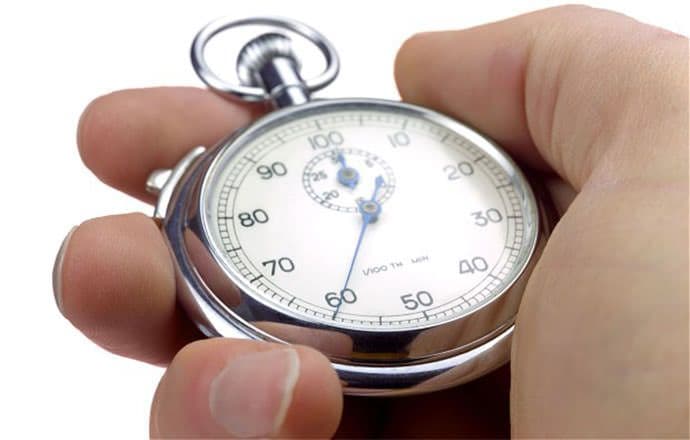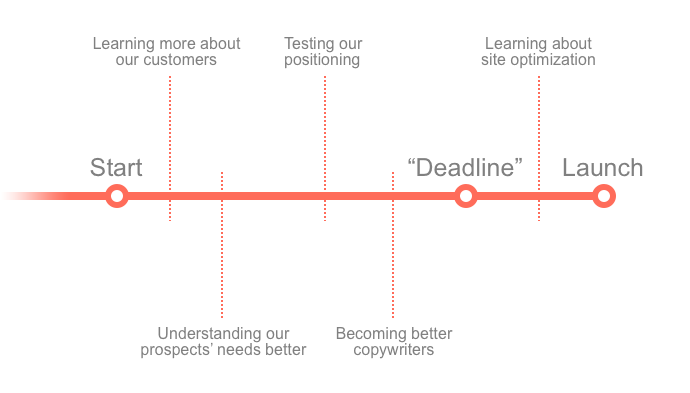How I Build Patience (And How You Can, Too)
Impatience is one of the deadliest mistakes in business. Here’s how to control it.
If you’re like most people, then your impatience has hurt you.
It still hurts you.
In fact, you’ll probably rush to a decision this week that will end up with negative consequences.
In most cases, moving fast is a good thing, especially in business. Momentum is one of the most valuable assets that you have.
But making choices because you’re too impatient to wait for a better choice?
That’s dangerous.
It’s something that I’ve talked about before on this blog, but it’s something that I have to constantly remind myself about.
And these past couple of weeks have forced me to remind myself of my own advice on more than a few occasions.
So I’d like to share it with you, in case you’re struggling with impatience, too.
The Time Impatience Cost Me $10,000
“Move fast and break stuff” is a startup mantra. Here’s a different take on things…
“This doesn’t work.”
The first email came a few minutes after we pushed it live.
“Looks like it’s broken for me.”
“The widget isn’t showing up on our site.”
“How do I turn it on?”
Two years ago, we released an updated version of our (now-discontinued) live chat app.
Within half an hour, our support mailbox was flooded with complaints about bugs and technical issues.
It wasn’t ready. And there was nobody to blame but me.
In the never-ending battle to balance our team’s time with the list of high-priority tasks we needed to accomplish, I had gotten impatient with our weeks-long effort to get this new version of live chat in our customers’ hands.
It seemed to work fine for me, and despite our developers’ recommendations that we spend more time testing, I made the call: “Let’s just get this out there.”
The ensuing mess cost us more than $10,000 in lost productivity as we worked to answer emails and pulled the app down to fix it. Worse, it cost us the trust of customers who had taken a chance on a young startup, believing that we would reward their risk with a product that worked the way we said it would.
It was a painful but important lesson for me: patience is one of the most valuable skills to develop as an entrepreneur.
The Power of Patience in Business
There’s plenty of research that supports the value of patience.
A number of studies have shown that people who are patient tend to be more healthy, happy and successful.
Anecdotally, I know that impatience has a negative impact on my mood, and more importantly, my ability to make decisions.
When I’m feeling impatient, I’m more impulsive. If we’re building something that I’ve been antsy to release for weeks, and the only thing standing between us and going live is a bit of polish, it’s tempting to say “fuck it” and push the feature out.
Sometimes, that can be a good thing. We’ve used the lean approach to many of our releases in the past, and it’s helped us get early feedback and make fast improvements.
But it’s not always useful to “just ship it.”
With marketing, you don’t get a second chance. We spend many hours on every blog post, every email, every piece of copy, to make them as good as we possibly can.
The same is often true with UX changes, especially those that impact the onboarding experience. New customers aren’t as forgiving as those who have been with you for years, and delivering a less-than-perfect experience can easily be the difference between retention and churn.
And as I recounted at the beginning of this post, shipping too early has hurt us badly in the past.
Shipping something before it’s ready can be dangerous, but I’m human, and impatience can — and sometimes does — still get the best of me. It’s been a tough lesson to learn over the years, but I know that actively working on developing patience has made me a better entrepreneur.
Four Ways I’ve Built — and Continue to Build — Patience
1) Being Honest About the Consequences
I can’t count the number of times I’ve said: “We need to get this out by Friday.”

But of those times, I can only recall a few where I was able to follow that statement up with “because…”
We often set arbitrary deadlines, and that can be a very good thing for keeping ourselves motivated and productive.
But things aren’t always in our control, and external factors can cause us to miss those deadlines.
Here’s the thing: I can’t think of a single time where missing a deadline has had a long-term, negative impact on our business. I can think of multiple times where shipping a buggy or unpolished feature has hurt us. I’d much rather do the former than the latter.
I’m not advocating laziness, or a casual attitude toward deadlines. We hustle hard every single day, and we work overtime to hit deadlines when we need to.
But there are times when a deadline isn’t absolute, and when we — and our customers — benefit from me being a little bit more patient and taking a bit more time to get things right.
Takeaway: Deadlines are a valuable tool for productivity, but if you’re not going to hit your deadline, be honest with yourself: are you better off shipping something that’s not quite done? In many cases, for us, that answer has been no.
2) Taking Lessons From Other Areas of Life
As a Rhode Island boy, I’ve been surfing since I was 15 years old.

Funny thing about the ocean: it doesn’t give a damn about your schedule.
I’ve waited hours for a good wave.
I’ve waited hours and gone home disappointed that a good wave never came.
I’ve waited hours and been rewarded with 10 seconds of pure bliss that put me in an amazing mood for days.
When I was younger, surfing taught me patience, and that the wait for a great wave pays off in spades.
As I got older and busier, I had less time to spend on the beach, and didn’t get to appreciate that constant, unavoidable reminder of the value of patience.
At Groove, I’ve forced myself to make a little more time for play, and surfing is a big part of that.
And every time I’m out there at Ruggles, I re-learn a valuable lesson that I can instantly apply to my work.
Takeaway: Many hobbies take patience to learn and get good at, but even though we’ve developed that patience, we don’t think to apply it to our business lives. Being more aware of how patience helps you in all areas of life can help you become a more patient person at work, too.
3) Not Measuring Against Someone Else’s Yardstick
It’s ridiculously easy to look at a competitor and think, “They released [Feature X] last week. We need to build it NOW!”
There are multiple reasons why that attitude is a poor way to make product choices, but it’s a tough thought to avoid. I know I’m guilty of it.
There’s a quote that I love, though I’ve seen it attributed to so many different people that I have no idea who’s ultimately responsible for it: “Never compare your beginning to someone else’s middle”.
My natural impulse is to measure my progress against people who are more successful than I am, and who have been at this game for far longer.
And while that’s a great driver for motivation, it’s a terrible way to build patience.
We often see the end result (e.g., a competitor releasing a specific feature), but not the amount of work that went into achieving that result (the many weeks they spent building and testing that feature). Trying to shortcut our way to achieving that result is a great way to guarantee that we’ll never be as good as the people we’re competing against.
Takeaway: Don’t let other people’s progress make you lose sight of your own path. Comparing your beginning to someone else’s middle can be a quick path to losing patience and falling behind.
4) Track — and Celebrate — Little Wins
When you spend weeks working towards a goal, it’s easy to think of the results as binary: either we accomplished that goal, or we didn’t.
But that, for me, is a dangerous mindset, because if we don’t hit our deadline, then the binary perspective makes our whole project a failure, even if we had a number of smaller wins during the process.
I’ve found it immensely valuable to break down every project into smaller micro-goals to help us track those smaller wins.
For example, we finished our last website redesign a few days late.
But along the way, we tracked a number of small wins that made our business stronger:

Having the progress be so visible makes it easier to be patient about the ultimate result, and seeing the little wins helps motivate our team to keep hustling.
Takeaway: Don’t think of your deadlines as pass/fail only. Remember to track and celebrate the little wins along the way. It’ll make you more patient and productive.
How to Apply This to Your Business
Patience is one of the toughest skills to develop, yet one of the most valuable assets I’ve built as an entrepreneur.
It’s not always a tool you’ll want to use: there are situations where overtime, a bit of extra hustle, and putting pressure on the people around you to move faster are necessary.
But for me, and for the sustainable growth of our business, I’ve found that those situations are better off as the exceptions, and not the rule.
I hope that these techniques help you develop the patience to wait when you need to, and to ultimately make better decisions for your business.